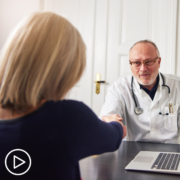What Should CLL Patients Know About Clinical Trial Treatment Options?
What Should CLL Patients Know About Clinical Trial Treatment Options? from Patient Empowerment Network on Vimeo.
What do chronic lymphocytic leukemia (CLL) patients need to know about clinical trial treatment options? Dr. Matthew Davids explains how clinical trials fit into the array of CLL treatments, the benefits of speaking to a CLL specialist, and online resources for finding clinical trials.
Dr. Matthew Davids is Director of Clinical Research in the Division of Lymphoma at Dana-Farber Cancer Institute. Learn more about Dr. Davids here.
Related Resources:

|

|
Transcript:
Katherine:
Right. Where do clinical trials fit in with the treatment approaches?
Dr. Davids:
So, clinical trials are really how we’ve made all these advances in CLL over the last decade. It’s how we learn about new treatments. It’s how we learn about how to optimize the treatments that we have. I think sometimes patients have a misconception that clinical trials are a last resort, the idea that you’ve exhausted all the standard options and then you go to a clinical trial as your last hope. But I actually like to kind of turn that on its head and say that clinical trials are actually the first resort, the first best option for patients. Whenever patients can get access to a clinical trial at any stage of their disease, I would really encourage them to consider it.
We have quite a few clinical trials now in the frontline setting, meaning as an initial treatment for CLL, including some that are in development and will open soon. And these are the studies that are going to really help us define what the optimal regimens are. What’s the optimal sequence of these different novel agents?
And in CLL, really, we’re at a point where the research on the disease is so mature that when you’re in a clinical trial you’re either going to be on one regimen that you know you’re getting and you know it’s going to be an effective regimen, or you might be in a comparative trial where you could be randomized to one of two or three different regimens, but you know that each one of those regimens is one that we think is a great regimen. We just don’t know which one is optimal for individual patients. So, this is not a situation where there’s placebo-controlled trials where you don’t know if you’re going to get an active treatment or not. CLL is an area where we design our clinical trials so that all patients are going to be benefiting from cutting-edge approaches.
And so, not all patients have access to trials, and that’s okay. Again, we’re fortunate that we have many good options that can be given locally, but I do encourage patients even if they’re only able to travel to a CLL specialist once to have an initial consultation to think about doing that to get a CLL specialist on your team, so to speak. That way they can identify clinical trial options that may be a good fit, and even if not, they can advise on what the optimal treatment options are to receive locally with your own oncologist.
Katherine:
How do patients find out about these clinical trials?
Dr. Davids:
I do think the best way is through a CLL specialist because certainly they would have a great pulse on the trials, they have available at their own center. They should also have a sense for what trials are available maybe at other centers. Some of that can also be, there’s a great resource through The Leukemia & Lymphoma Society where they can help navigate patients toward specific trials that may be applicable to them.
There’s also a website called clinicaltrials.gov. It can be a little challenging if you’re not familiar with it to navigate the site, but it is actually pretty straightforward. You can put in the disease and look at different options for trials based on different drugs, for example. They’ll list the eligibility criteria for the trial. That’s often I find a way that patients can begin to identify whether they may be a candidate. You can’t tell from the website whether you’re definitely a candidate or not. You really need to partner with an investigator who’s on the trial to learn that, but it certainly can be a good starting point to figure out what’s out there.











